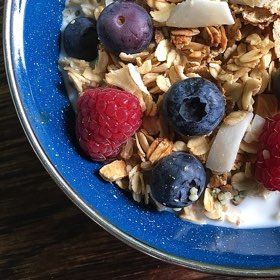
Clients come to me with a huge range of health concerns and goals. But no matter what the goals are, we always discuss the state of their digestion.
Why is digestion at the centre of my practice? When digestion is not functioning at its best, absorption of nutrients – protein, fat, carbohydrate/sugar, minerals & vitamins – can be impaired. Over long periods, impaired digestion can lead to a wide range of symptoms including fatigue, aches, fogginess, acne, weight gain/loss – the list goes on.
One of the most common signs that digestion is not at its best is bloating. Do you frequently find your clothes feel tighter at the end of the day? Or your abdomen feels uncomfortable or painful? Perhaps your abdomen is hard or looks larger than usual? These are all signs that your digestion could use some support.
These are my top 10 tips for improving digestion & reducing bloating…
- Cut back on sugary foods
Bloating is usually caused by the production of gas in the large intestine and that gas is a result of fermentation. Fermentation is a natural and important process in the large intestine. However, when fermentation is out of control, bloating can become frequent and is sometimes painful. This can be a sign that the bacteria in the gastrointestinal tract are imbalanced – which is referred to as dysbiosis. Cutting back on sugary foods can help reduce malfermentation and bring your gut microbiome back into balance.
- Try fermented foods or drinks
Fermented foods & drinks offer a natural way to introduce beneficial bacteria into the gastrointestinal tract. There are trillions of bacteria in the gut and these little organisms offer support not only for digestion but also mental health, immune function and even weight management. Kefir, water kefir, kombucha, miso, natto, tempeh, kimchi, yogurts and sauerkraut are all great fermented foods to try. Kefir is also incredibly easy to brew at home! If you’re not a fan of fermented foods, you can try a probiotic by a good quality brand from your local health food store.
(Note: If you have a health condition, it is always best to speak with your healthcare provider before trying these supplements).
- Stress management

Yes, stress directly impacts the function of our gastrointestinal tracts. There’s a reason you hear the phrase ‘rest & digest’. Digestion requires the body to focus its energy and blood supplies on your digestive organs ensuring you absorb all of the lovely nutrients from your food. When you are stressed – or in the ‘fight or flight’ state – your body is focussing its energy on protecting you from danger or perceived danger, drawing blood supply away from the digestive tract. This can have a negative impact on the health of the gut microbiome, motility of the gastrointestinal tract and the digestive secretions needed to breakdown food and absorb nutrients. Have meal times in an environment that is stress-free and try using controlled breathing techniques before a meal to bring yourself into a calm state before eating.
- Chew your food thoroughly
Your saliva is actually pretty incredible! It starts off the digestive process and even contains some digestive enzymes. The process of chewing also stimulates the secretion of digestive enzymes & acid in your stomach. As simple as this tip sounds, the start of the digestive process is key to improving things down the line. Poorly digested food is an incredibly common cause of bloating and wind for so many of us. Yes, meal times may take longer but the improvements are worth it.
- Always eat at the table
By sitting upright while eating, your gastrointestinal tract is structurally supported to encourage healthy digestion and reduce bloating as well as indigestion.
- Avoid fizzy drinks
Often bloating and gas can be a result of swallowing air. There’s a great reason your mum always told you to chew with your mouth closed! Fizzy drinks introduce air into your digestive tract so eliminating them from your regular diet may improve bloating symptoms.
 7. Exercise everyday!
7. Exercise everyday!
Just 30 minutes of exercise each day has been shown to reduce the risk of a wide range of conditions including cardiovascular disease. It also supports the health of your digestive system. Exercise encourages appropriate motility of the gastrointestinal tract and growth of a large variety of beneficial bacteria.
8.Avoid drinking large volumes with a meal
If you’ve ever experienced heartburn or reflux after a big meal you’ll probably understand where this tip comes from. The environment in your stomach should be acidic to support digestion. When we consume large quantities of any fluid (beer, cider, water, juice, cola, etc), the acidity in your stomach can become diluted slowing digestion and resulting in prolonged feelings of fullness, indigestion and bloating. So make sure you drink water throughout the day.
9. Lemon Juice & Cider Vinegar
While the evidence base isn’t necessarily there for this remedy, some people feel it can have a significant impact on digestion. Try one teaspoon of either lemon juice or apple cider vinegar in a small glass of water before a meal. It can support the acidic environment in your stomach needed for digestion.
While these tips can reduce bloating for some, it’s important to remember that digestion is a complicated process. Without first identifying the root cause of your bloating (stress, IBS, constipation, food intolerances, dysbiosis, IBD, etc), it’s hard to know what could resolve it. In my clinic, I frequently use comprehensive stool analysis testing to identify key areas of digestive impairment and create a bespoke management plan for each client.
10.Listen to your gut
 If you suspect a food or group of foods is the cause of your bloating, then try eliminating them entirely from your diet for two weeks straight. An elimination diet like this can be an excellent tool for identifying the cause of symptoms. Don’t forget to read food labels for hidden ingredients! This kind of diet must be done in a strict manner in order to reach a conclusion about the excluded food(s). It should also be done under the guidance of a nutrition professional to ensure you are always getting sufficient nutrition.
If you suspect a food or group of foods is the cause of your bloating, then try eliminating them entirely from your diet for two weeks straight. An elimination diet like this can be an excellent tool for identifying the cause of symptoms. Don’t forget to read food labels for hidden ingredients! This kind of diet must be done in a strict manner in order to reach a conclusion about the excluded food(s). It should also be done under the guidance of a nutrition professional to ensure you are always getting sufficient nutrition.
If you think your digestion is in need of a reboot, get in touch to learn more about how I can help you improve your health.
Book your first appointment with Wrisley during the month of July and enjoy 10% off.
References:
Batacan, R.B., et al., (2017). A gut reaction: the combined influence of exercise and diet on gastrointestinal microbiota in rats. Journal of Applied Microbiolgy. 122 (6): 1627-1638.
Hunter, J., (2007). Irritable Bowel Syndrome: The Essential Guide to irritable Bowel Syndrome, Its Causes and Treatments. London, Vermi;ion.
Moloney, R.D., et al., (2016). Stress and the Micrbiotia-Gut-Brain Axis in Visceral Pain: Relevance to Irritable Bowel Syndrome. CNS Neuroscience & Therapeutics. 22, 102-117.
Porth, C.M. and Matfin, G., (2009). Pathophysiology: Concepts of Altered Health States. 8th ed. Philadelphia: Wolters Kluwer Health l Lippincott Williams & Wilkins.



